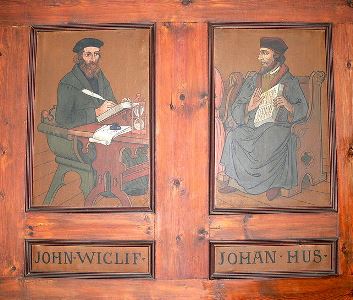CHURCH HISTORY
Church Foundations
John Hus
By Brandon Markette

The Bohemian church was already familiar with John Wycliffe's teachings. King Richard II of England married Anne of Bohemia in 1382, thus providing for close connections between the two nations. By 1401 most of Wycliffe's teachings were known in Prague, including his more controversial books. Like in England, some among the Bohemians supported Wycliffe ideas while others viewed his as a false teacher. In this way a divide existed among the people to whom Hus preached.
It was Wycliffe's condemnation of clerical corruption which resonated with the people of Bohemia, including the young rector, John Hus. Though he did not adopt all of Wycliffe's positions, those he did would land Hus in rather hot water. By 1403, the University of Prague condemned 45 of Wycliffe's writings. This led to further problems between the Germans in Bohemia and the native Bohemians. Eventually a split occurred, with the German faction founding Leipzig University. With University of Bohemia firmly under control, John Hus became its rector in 1409.
The split between the Germans and the Bohemians did not resolve the problems raised by the arrival of Wycliffe's teaching in Bohemia. Because Hus continued to teach many of Wycliffe's reform principles, the archbishop secured a preaching ban from the Pope. Hus refused to obey and found himself excommunicated by the Bishop in 1410. In 1412, matters grew worse still. As the Pope offered indulgences to anyone supporting his war against Naples, Hus preached against such abuse of spiritual matters. His preaching landed him trouble with Rome, resulting to his excommunication from Rome and an interdict being placed upon the city of Prague. So long as the interdict remained, no religious services could take place within the city. Therefore, Hus retreated to Southern Bohemia and wrote his two books: The Church and On Simony.
In 1414, a council convened at Constance. The goal of the council was to repair the Great Schism within the church. Hus was invited and chose to attend after receiving safe conduct promises from Emperor Sigismund. However, those promises were not honored. Hus was arrested and imprisoned by the followers of Pope John XXII. He was tried by the council at Constance and convicted of heresy. Hus refused an opportunity to repent and, on 6 July 1415, John Hus was burned at the stake outside the city.
Though the council believed this act would stem the tide of reform, it did no such thing. The council's continued action against the followers of Hus led to a civil war, but did not destroy the opposition. Eventually the reformers split into two camps: those wanting minor reform within the Roman Catholic Church (such as the issue of who can partake in the Cup of Communion) and those wanting a complete, top-down reform.
What started in England with John Wycliffe now spread to John Hus' Bohemia. Some years later, Hus' followers would connect with Martin Luther and John Calvin, taking their place in the Protestant Reformation.
Image Source: Wall mural of John Wiclif and John Hus; Dalhems church, Gotland; courtesy Wolfgang Sauber; Permission under GNU Free Documentation License.
Tags: Biblical-Truth | False-Teaching | History-Apologetics | Ministry-Church
comments powered by Disqus
Published 5-30-2014

